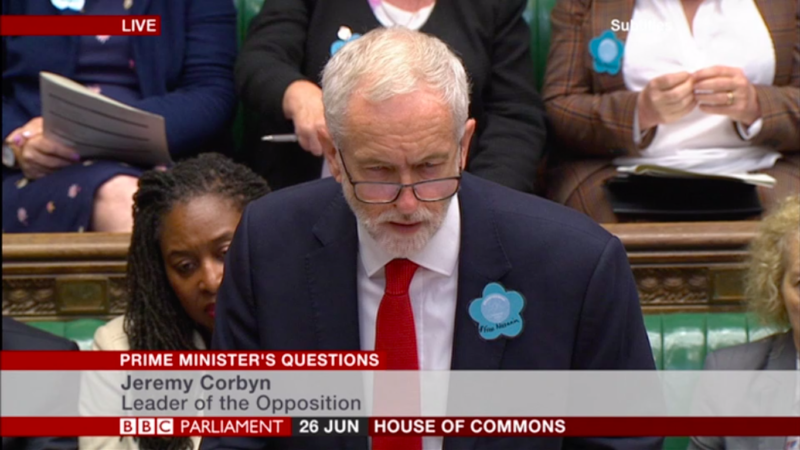
This week, Jeremy Corbyn chose to focus on the policy area that interests him most – foreign affairs. It was particularly appropriate as opposition members all wore a #FreeNazanin badge. The former Stop the War Coalition chair took the chance at PMQs to question our caretaker Prime Minister on British involvement in the Saudi Arabian-led intervention in Yemen. Unlike opposition to the Iraq war or Syrian air strikes in 2015, the argument that we shouldn’t be selling weapons that will be used to kill Yemenis is relatively uncontroversial within the Parliamentary Labour Party, even if some of those MPs wouldn’t back Corbyn’s non-interventionist approach in other contexts.
The Labour leader picked up on a recent news story that was largely ignored but represented a crucial victory for anti-war campaigners. They won a legal challenge last week over the UK government’s decision to continue licensing military equipment for export to Saudi Arabia, successfully arguing that the arms could be used in violation of international humanitarian law. As Corbyn quoted, the UN has described the Yemeni situation as “humanity’s biggest preventable disaster”. Germany and Denmark have already taken decisive action by banning arms exports to Saudi Arabia and the US Congress has voted that way too. Why, then, is the UK supporting the Saudi-led coalition’s air campaign?
Theresa May did not back down, instead confirming that the UK government would be seeking permission to appeal the court judgement. The Prime Minister argued that the intervention was made at the request of the “legitimate” Yemeni President, head of the “internationally recognised” government, following a rebel insurgency, and that this made British involvement A-OK. She refused to answer the question put to her by the opposition leader of whether there are “serious ongoing violations of international humanitarian law by Saudi Arabia in Yemen – yes or no”.
Corbyn’s subject matter was not a choice without significant risks. Lloyd Russell-Moyle got into trouble earlier this week when it was discovered that the StWC event he was hosting in parliament had invited a Houthi leader. (The Houthi movement’s slogan is “God is great, death to America, death to Israel, curse the Jews, victory to Islam”.) Although he first called fellow Labour backbencher Graham Jones a “tit” for criticising the invitation, it was later rescinded. As to be expected, the PM referred to the incident and used it to assert that Labour was “yet again… on the wrong side of the argument”.
That wasn’t the only risk. Whenever the Labour leader talks about foreign policy, he can expect to be attacked on the basis of his past comments on terrorist groups. “Let’s just look at some of the relationships that the Rt Hon Gentleman supports,” May said, summing up the session today. “When people were killed in Salisbury, his sympathies were with Russia. When terrorists were killing our people, his sympathies were with the IRA. And in the recent tanker attacks in the Gulf, his sympathies were with Iran. He never backs Britain and he should never be Prime Minister.”
Unfortunately, these concluding comments might have overshadowed the entirely justified and much-needed criticism of a policy that sees this country pump £4.6bn of arms into a brutal bombardment that has killed tens of thousands. It may even have been overshadowed by Ian Blackford’s follow-up opposition question about the Tory leadership contenders – simply because that’s easier for Westminster to ponder.




More from LabourList
‘Council Tax shouldn’t punish those who have the least or those we owe the most’
Two-thirds of Labour members say government has made too many policy U-turns, poll reveals
‘Two states, one future: five steps on the path to peace for Israelis and Palestinians’